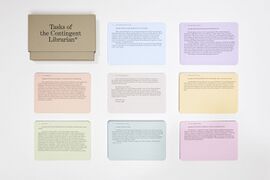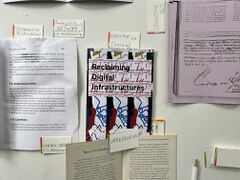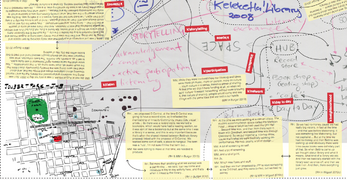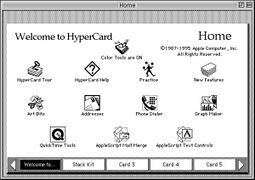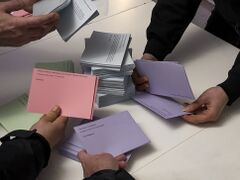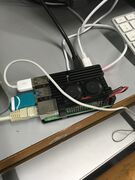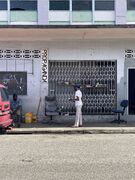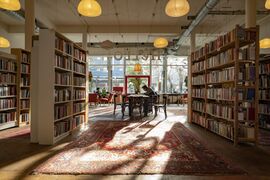How Do We Library That?: Difference between revisions
| Line 19: | Line 19: | ||
* sharing knowledge is a social activity | * sharing knowledge is a social activity | ||
* book as program, program as library | * book as program, program as library | ||
* fugitive libraries, the undercommons of libraries in the margins: https://placesjournal.org/article/fugitive-libraries/?cn-reloaded=1 | |||
--> | --> | ||
Libraries are complex | Libraries are complex social infrastructures. It's difficult to describe them without speaking in the generic plural "libraries", or specific singular "a library/the library"; as if they were all the same. Universalisms won't help in understanding what is particular about libraries and collections of texts, or why they have value to their readers. | ||
Public libraries function more than simply as access points to knowledge. They facilitate many actions; including reading together, annotating, organising and structuring. As public libraries vanish, [shadow libraries] and [fugitive libraries https://placesjournal.org/article/fugitive-libraries/?cn-reloaded=1] appear in their wake, answering the call for replacement. How can we understand a library, and make it understandable to others? What are the access points to this library-in-the-making, and where do readers cross over? | |||
== Special Issue 19 == | == Special Issue 19 == | ||
Revision as of 16:53, 13 September 2022
Context
Libraries are complex social infrastructures. It's difficult to describe them without speaking in the generic plural "libraries", or specific singular "a library/the library"; as if they were all the same. Universalisms won't help in understanding what is particular about libraries and collections of texts, or why they have value to their readers.
Public libraries function more than simply as access points to knowledge. They facilitate many actions; including reading together, annotating, organising and structuring. As public libraries vanish, [shadow libraries] and [fugitive libraries https://placesjournal.org/article/fugitive-libraries/?cn-reloaded=1] appear in their wake, answering the call for replacement. How can we understand a library, and make it understandable to others? What are the access points to this library-in-the-making, and where do readers cross over?
Special Issue 19
We will begin with searching for proposals around how we "do" libraries together.
We will question indices and indexical attitudes that point toward universalisms, and discover in the process a library-in-the-making.
In a 2019 interview, researcher and architect Dubravka Sekulić asks, "what is useful knowledge for people to understand what surrounds them? Or for example, what can help to understand the politics of knowledge distribution". It is clear that what we need is to understand "how to offer people tools that allow them to interpret the position in which they are".
Libraries as:
- distribution networks
- sets of practices
- sites of cultural literacy
- sites of production
- sites of learning
- social spaces of text
Rather than looking only at what a library stores, we will also discover what it produces. We will consider collections as not only comprised of things, but also people and actions. In other words, we will attempt to collectively and individually answer the question "How do we library that?".
Schedule
One: Tasks of the Contingent Librarian
Monday, September 19th, 2022
11:00-17:30 Introduction to the Special Issue (with Simon)
Pad:
To introduce ourselves we will use cards from Tasks of the Contingent Librarian:
- 52 cards on the table (e.g. bootlegging, indexing, scanning, reading, technologising the word, &c)
- Choose a card that matches your curiosities and/or interests
- Exchange a card with someone else, describing how you relate to the card
- Exchange a card, relate that relation to someone else
- Make a new card, what information does it need?
Tuesday, September 20th, 2022
11:00-18:00 Prototyping with Manetta & Joseph
Pad:
Wednesday September 21st, 2022
11:00-18:00 Introduction to Methods with Steve
Pad:
Two: Print Screen
Monday, September 26th, 2022
Pad:
Tuesday, September 27th, 2022
11:00-18:00 Prototyping with Manetta & Joseph
Pad:
Wednesday September 28th, 2022
11:00-18:00 Methods with Steve
Pad:
Three: Text, TBC
Monday, October 3rd, 2022
Pad:
Tuesday, October 4th, 2022
11:00-18:00 Prototyping with Manetta & Joseph
Pad:
Wednesday October 5th, 2022
11:00-18:00 Methods with Steve
Pad:
Four: Scribes Getting Personal ☞
Monday, October 10th, 2022
Pad:
Tuesday, October 11th, 2022
11:00-18:00 Prototyping with Manetta & Joseph
Pad:
Wednesday October 12th, 2022
11:00-18:00 Methods with Steve
Pad:
Five: Do e-books dream of electronic spreadsheets?
Monday, October 17th, 2022
Pad:
Tuesday, October 18th, 2022
11:00-18:00 Prototyping with Manetta & Joseph
Pad:
Wednesday October 19th, 2022
11:00-18:00 Methods with Steve
Pad:
🍁🍁🍁
Autumn Vacation
Six: Binding Along the Spine
Monday, October 31st, 2022
Pad:
Tuesday, November 1st, 2022
11:00-18:00 Prototyping with Manetta & Joseph
Pad:
Wednesday November 2nd, 2022
11:00-18:00 Methods with Steve
Pad:
Seven: A Textile, A Framework
Monday, November 7th, 2022
Pad:
Tuesday, November 8th, 2022
11:00-18:00 Prototyping with Manetta & Joseph
Pad:
Wednesday November 9th, 2022
11:00-18:00 Methods with Steve
Pad:
Eight: Paper Machines
Monday, November 14th, 2022
References:
Pad:
Tuesday, November 15th, 2022
11:00-18:00 Prototyping with Manetta & Joseph
Pad:
Wednesday November 16th, 2022
11:00-18:00 Methods with Steve
Pad:
Nine: Readable, Writeable, Executable
Monday, November 21st, 2022
Pad:
Tuesday, November 22nd, 2022
11:00-18:00 Prototyping with Manetta & Joseph
Pad:
Wednesday November 23rd, 2022
11:00-18:00 Methods with Steve
Pad:
Ten
Monday, November 28th, 2022
Pad:
Tuesday, November 29th, 2022
11:00-18:00 Prototyping with Manetta & Joseph
Pad:
Wednesday November 30th, 2022
11:00-18:00 Methods with Steve
Pad:
Eleven
Monday, December 5th, 2022
Pad:
Tuesday, December 6th, 2022
11:00-18:00 Prototyping with Manetta & Joseph
Pad:
Wednesday December 7th, 2022
11:00-18:00 Methods with Steve
Pad:
Twelve
Monday, December 12th, 2022
Pad:
Tuesday, December 13th, 2022
11:00-18:00 Prototyping with Manetta & Joseph
Pad:
Wednesday December 14th, 2022
11:00-18:00 Methods with Steve
Pad:

